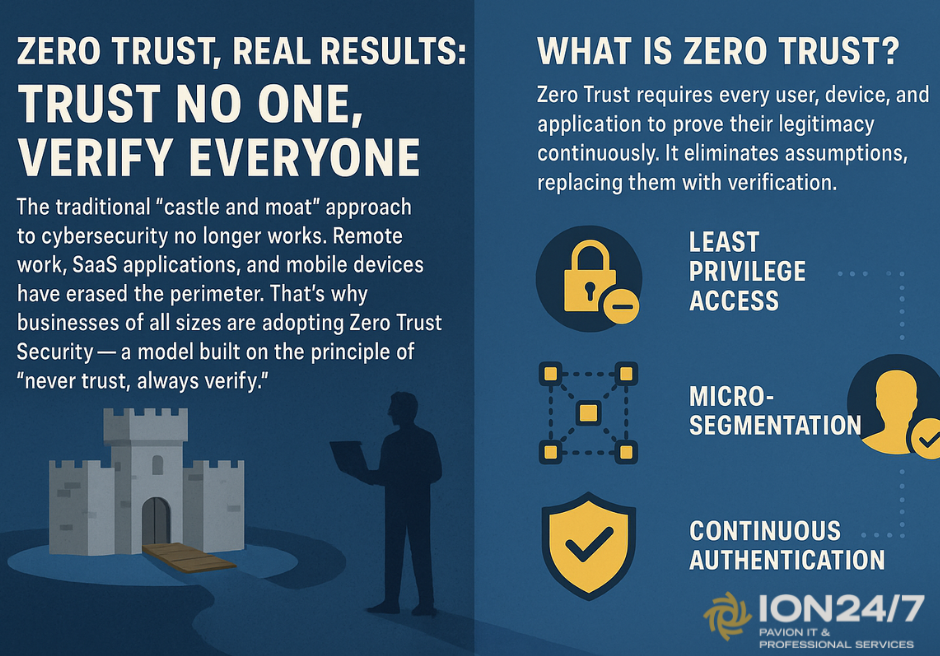Trust No One, Verify Everyone
The traditional “castle and moat” approach to cybersecurity no longer works. Remote work, SaaS applications, and mobile devices have erased the perimeter. That’s why businesses of all sizes are adopting Zero Trust Security, a model built on the principle of “never trust, always verify.”
What Is Zero Trust?
Zero Trust requires every user, device, and application to prove their legitimacy continuously. It eliminates assumptions, replacing them with verification.
Core Principles:
- Least Privilege Access: Users only get access to what they need.
- Microsegmentation: Networks are divided to limit attacker movement.
- Continuous Authentication: Access is verified in real time, not just once at login.
Why SMBs Can’t Wait
Many SMB leaders believe Zero Trust is only for large enterprises. The reality is the opposite: SMBs are more vulnerable.
- 60% of SMBs close within 6 months of a cyberattack.
- Cyber insurers increasingly require Zero Trust controls.
- Hybrid work has expanded the attack surface beyond traditional protections.
Business Benefits Beyond Security
- Lower Risk of Breach: By verifying every access attempt, stolen credentials are less effective.
- Simplified Compliance: Zero Trust maps directly to HIPAA, PCI DSS, and SOC2 requirements.
- Operational Efficiency: Centralized identity control reduces IT help desk tickets.
Case Study: A manufacturer adopting Zero Trust cut password-related help desk tickets by 40% and avoided a potential $500,000 breach when compromised credentials were blocked by continuous authentication.
Implementation Steps for SMBs
- Assess Current Access Policies – Identify gaps and excessive privileges.
- Adopt MFA Everywhere – Multi-factor authentication is the first step toward Zero Trust.
- Leverage Identity & Access Management (IAM) – Centralized control simplifies enforcement.
- Monitor and Iterate – Zero Trust is not a one-time project; it’s an evolving model.
Zero Trust isn’t just a buzzword — it’s a business survival strategy. For SMBs, it means stronger protection, lower risk, and greater confidence.
Start your Zero Trust journey with ION247. Contact us today to protect your business before the next breach attempt.
Q: What does Zero Trust security mean?
Zero Trust is a cybersecurity model built on the principle of “never trust, always verify.” It requires continuous verification of every user, device, and application.
Q: Why is Zero Trust important for SMBs?
SMBs are increasingly targeted by cyberattacks. Zero Trust reduces the risk of breaches, helps with compliance, and strengthens overall security.
Q: Is Zero Trust expensive to implement?
Not necessarily — many SMBs start with cost-effective steps like enforcing multi-factor authentication (MFA) and gradually adopt more controls over time.
Q: How does Zero Trust improve compliance?
Zero Trust aligns with regulatory frameworks like HIPAA, PCI DSS, and SOC2 by controlling access, segmenting networks, and verifying identity.

